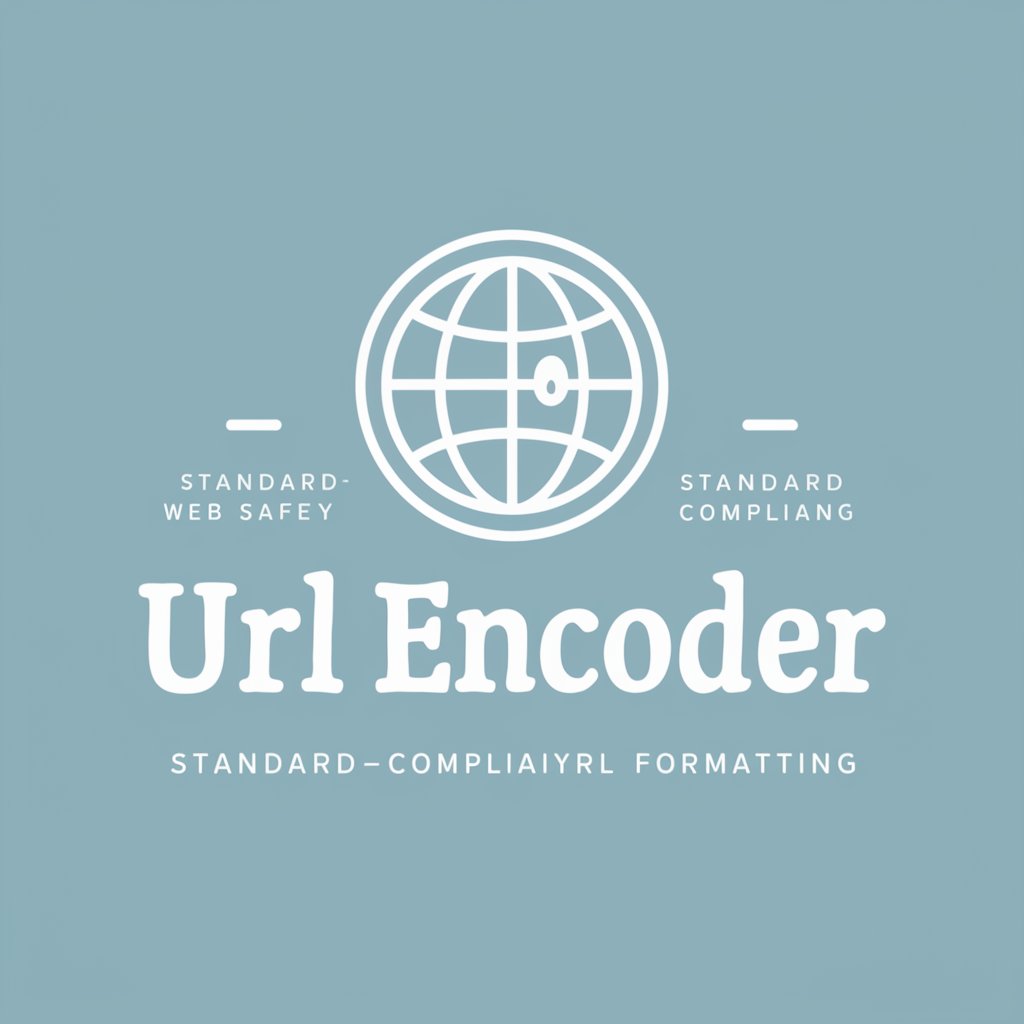URL Encoder - Easy URL Encoding/Decoding

Hey there! Need help with URL encoding or decoding? Let's get started!
Simplify URL management with AI power
Generate a logo for a user-friendly URL encoding and decoding tool...
Design a welcoming and simple logo for a web safety-focused application...
Create an engaging and clear logo that emphasizes ease of use for URL formatting...
Design a friendly logo for a tool named 'URL Encoder' that helps with URL conversions...
Get Embed Code
Introduction to URL Encoder
URL Encoder is a specialized tool designed to simplify the process of converting characters in a URL into a format that can be transmitted over the internet. URLs often contain characters that are not allowed in a URI (Uniform Resource Identifier) or have special meanings in the context of a URL. URL Encoder takes these characters and replaces them with a '%' followed by two hexadecimal digits representing the ASCII code of the character. This process, known as percent-encoding or URL encoding, ensures that the web addresses are universally readable and compatible with web standards. For instance, a space in a URL is encoded as '%20', and an ampersand ('&') is encoded as '%26'. The tool is designed to be user-friendly, catering to both technical and non-technical users, with a focus on providing clear, concise, and accurate URL conversions. Powered by ChatGPT-4o。

Main Functions of URL Encoder
Encoding URLs
Example
Converting 'https://example.com/about us' to 'https://example.com/about%20us'
Scenario
When a user wants to share a URL containing spaces or special characters in a web form or via email, encoding ensures the URL remains valid and functional.
Decoding URLs
Example
Transforming 'https://example.com/about%20us' back to 'https://example.com/about us'
Scenario
For developers or content managers who need to understand the original format of an encoded URL for editing or analysis purposes.
Handling Complex URL Conversions
Example
Encoding query strings like 'https://example.com/search?query=special characters & symbols' to 'https://example.com/search?query=special%20characters%20%26%20symbols'
Scenario
Useful in constructing URLs for GET requests in web applications, ensuring that query parameters are correctly encoded to prevent errors or misinterpretations.
Ideal Users of URL Encoder
Web Developers
Individuals who build and maintain websites or web applications. They benefit from URL Encoder by ensuring that URLs within their projects are correctly encoded, enhancing compatibility and security.
Digital Marketers
Professionals who create online content and advertisements. They use URL Encoder to encode URLs with tracking parameters, ensuring accurate analytics and campaign tracking.
Content Creators
Writers, bloggers, and social media influencers who share links with their audience. They can use URL Encoder to ensure that the links are error-free and functional across different platforms.
IT Professionals
This group includes network administrators and cybersecurity experts who need to analyze and decode URLs for security purposes or when troubleshooting network issues.

How to Use URL Encoder
Start your journey
Head over to yeschat.ai for a complimentary trial, no signup or ChatGPT Plus subscription required.
Identify your needs
Decide whether you need to encode a URL for web use or decode an encoded URL to understand its original format.
Input your URL or string
Enter the URL or string you wish to encode or decode into the URL Encoder interface.
Execute the process
Choose the 'Encode' or 'Decode' option based on your requirement to start the conversion process.
Review and use
Copy the encoded or decoded URL from the output field. Use it as needed in your web projects or for educational purposes.
Try other advanced and practical GPTs
Visual Identifier
Discover the world through AI eyes.

Desktop Publisher Pro
Empowering your designs with AI innovation.

Hockey Guide
AI-Powered Hockey Betting Advisor

Paris tour
Explore Paris with AI-powered Insights

Chat Canvas
Transform chats into visual stories with AI.

Easy Health Ai
Empowering your health decisions with AI

Logomaker
Crafting Your Ideas into Iconic Logos

F
Your AI-powered Fitness Companion

Digest
Empowering Insight with AI Analysis

Plant GPT
Discover Plants, Powered by AI

Fittings Expert
Empowering projects with AI-driven fittings expertise.

Leonardo AI Prompt Maker
Unleashing Creativity with AI-Powered Imagery

FAQs about URL Encoder
What is URL encoding?
URL encoding converts characters into a format that can be transmitted over the Internet. It replaces unsafe ASCII characters with a '%' followed by two hexadecimal digits.
Why do we need to encode URLs?
Encoding ensures that the data travels correctly over the web. It prevents misunderstandings between the browser and servers by clarifying which characters are part of the URL and which are separators.
Can URL Encoder handle all types of characters?
Yes, it can encode and decode a wide range of characters, including special characters used in query strings and path segments, ensuring they're web-safe.
Is it possible to double encode a URL?
Yes, but it's important to be cautious. Double encoding can lead to confusion and errors in how web applications process the URL. URL Encoder can help manage and correct double-encoded URLs.
How does URL Encoder ensure web safety?
It adheres to standards-compliant URL formatting, encoding unsafe characters, and offering guidance on when to encode or decode, thus maintaining the integrity of web communications.
